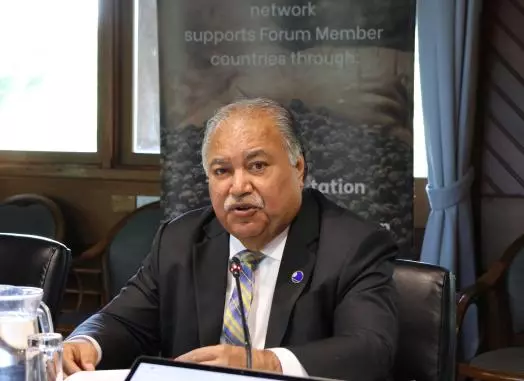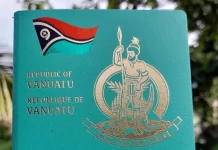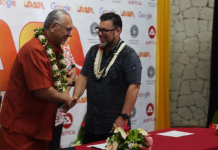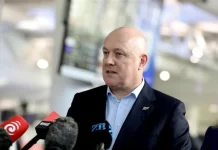Forum Secretary General, Baron Waqa has emphasised the importance of unity and collective action to drive sustainable development and economic growth in the Pacific region, during his opening remarks last week at the 8th Pacific Trade Invest (PTI) Independent Advisory Board Meeting.
Waqa acknowledged the significance of the gathering, calling it a “pivotal moment” in the region’s journey toward fostering resilience and prosperity.
“This gathering marks a critical moment in our collective journey to foster sustainable development, resilience, and prosperity across the Pacific,” he said, highlighting the importance of partnerships in overcoming the challenges facing the region.
Waqa took the opportunity to spotlight the accomplishments of PTI in 2024, praising its vital role in strengthening the Pacific’s economic landscape.
As of August 2024, PTI had achieved AUD$11.9 million (US$8 million) in export deals and facilitated AUD$4.7 million (US$3.17 million) in investments across the region. Additionally, PTI provided 578 services to Forum Island Countries, with 189 of those supporting female-led businesses.
Waqa said that PTI had supported 369 businesses, 114 of which were women-led, which he said exemplified the organisation’s commitment to fostering inclusive and sustainable economic growth.
“These figures speak volumes of PTI’s dedication to driving economic progress in our region,” Waqa said, commending the PTI General Manager, Trade Commissioners, and all involved for their tireless efforts in achieving these results. “Your passion and commitment are the backbone of our region’s prosperity, and for that, we are deeply appreciative,” he added.
Waqa also used the platform to reflect on the recent high-level meetings convened by the Pacific Islands Forum Secretariat, including the 53rd Pacific Islands Forum Leaders Meeting held in Tonga.
He noted that Forum Leaders’ discussions highlighted key regional priorities, including the urgent need for resilient development frameworks and strategic partnerships to bolster economic growth.
“Forum Leaders reaffirmed their commitment to the 2050 Strategy for the Blue Pacific Continent, underscoring its importance in addressing the pressing challenges facing our region,” Waqa said.
He added that some of the critical issues raised included the vulnerability of the region’s health systems, as 62 percent of critical facilities are near coastlines and are increasingly exposed to climate risks.
“Leaders highlighted the urgent need for climate-resilient healthcare infrastructure and solutions to address the health workforce crisis, particularly the shortages and uneven distribution of skilled professionals,” Waqa said.
Waqa reiterated Forum Leaders’ support for the Framework for Resilient Development in the Pacific (FRDP), with climate change and resilience central to these discussions.
He also pointed to the focus on strengthening education systems, improving digital and climate-resilient infrastructure, and bolstering support for the Pacific Resilience Facility (PRF), which is seen as critical to fortifying the region against climate impacts.
Concerns were also raised over the socio-economic consequences of derisking and debanking, with ongoing efforts to secure the regional Correspondent Banking Relationship (CBR) project.
Waqa emphasised the need for collaboration on this issue to protect the region’s financial stability.
Waqa also stressed the importance of labour mobility and education as strategic priorities, emphasising the role they play in ensuring that the Pacific’s workforce remains dynamic and adaptable to the evolving economic landscape.
“We must continue to emphasise the importance of labour mobility and education in our strategic priorities. These areas are crucial in ensuring that our workforce remains dynamic, adaptable, and well equipped to meet the evolving needs of our Blue Pacific region,” he said.
He acknowledged the challenges posed by climate change, economic shifts, and global competition but emphasised that a skilled and mobile workforce would be key to seizing emerging opportunities.
Waqa further addressed the region’s strategic partnerships, particularly during the 10th Pacific Islands Leaders Meeting (PALM10) in Tokyo, where Forum Leaders reaffirmed the importance of transparent and cooperative relations with Japan.
He noted that Japanese Prime Minister Fumio Kishida underscored his country’s commitment to the Pacific through the Pacific Bond (Kizuna) Policy, aligned with the 2050 Strategy for the Blue Pacific Continent.
“Of particular relevance to PTI is Leaders’ commitment to a sustainable long-term plan for the Pacific Islands Centre (PIC) Tokyo office, highlighting the importance of ongoing collaboration with Japan,” Waqa said, recognising the Pacific Islands Centre as an integral platform for fostering trade and investment between Japan and the Pacific region.
As the Pacific region continues to face the dual threats of climate change and economic shifts, Waqa highlighted the importance of focusing on innovation, strategic partnerships, and investment attraction to navigate these challenges. He noted that while the region is at a crossroads, it also stands on the cusp of transformation through collective action.
“Our region stands at a crossroads, facing unprecedented challenges, including climate change, labour mobility, and education. Yet, at the same time, these challenges present opportunities for continued growth, investment, and transformation,” Waqa said.
He urged the PTI network and its partners to harness their collective strengths, embrace cutting-edge technologies, and promote inclusive development to turn these challenges into opportunities.
“By harnessing our collective strengths, embracing cutting-edge technologies, and promoting inclusive development, we can turn these challenges into opportunities and chart a sustainable future for all Pacific peoples,” he said.
Waqa particularly highlighted the role of the Pacific Resilience Facility (PRF) and similar initiatives as vital components of the region’s efforts to build resilience against climate impacts.
He called for continued support and collaboration, stating that these initiatives are critical to ensuring the region’s future economic and environmental sustainability.
Waqa also emphasised the importance of unity, shared vision, and collaboration in achieving the region’s economic and development goals.
“With your continued support and collaboration, I am confident we can reach new heights and make a lasting impact on the region,” he said.
He also stressed the importance of building on the strong foundation laid by previous generations of leaders and partners.
“Let us build on the strong foundation laid by those before us. Let us work together to create tangible, positive impacts in the lives of those we serve. Our unity, shared vision, and dedication are our greatest assets,” SG Waqa said.














